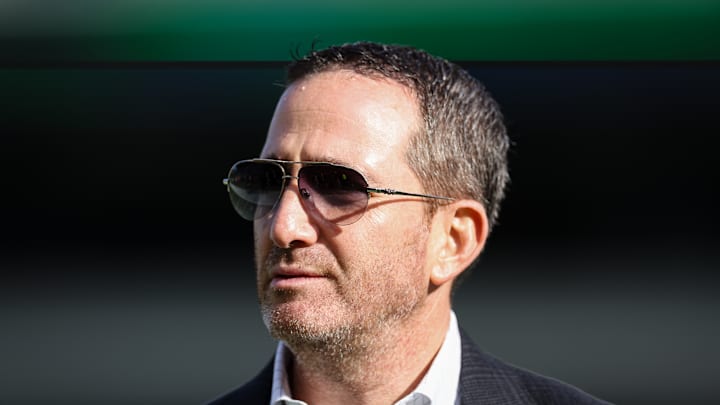From rival Saquon Barkley's murky contract situation with the New York Giants to Jonathon Taylor's reported plans to step away from the Indianapolis Colts, the running back position has been one of the topics at the center of NFL offseason discussion. Yet, as we turn to the Philadelphia Eagles' running backs room, there's nothing but optimism. Much of the thanks for that should be shown to the vice president/general manager, Howie Roseman.
Despite Miles Sanders' departure and Philly's loss of a top-five leader in rushing yards last season, hope springs eternal in Philly's locker room. 'Boobie' signed a four-year, $25.4 million contract and will now enjoy a reunion with former Eagles RB coach Duce Staley. While it won't be easy seeing the former second-round pick wearing Carolina blue, it was obvious the Eagles were unwilling to sign him at an inflated price tag.
It's a harsh reality but it's just that — a reality. According to the Ringer, no Super Bowl-winning team since 2013 has paid its leading rusher more than $2.5 million. Just last year, the Eagles witnessed this phenomenon first-hand.
Isiah Pacheco, a seventh-round rookie with a cap hit of $725k, ran for 76 yards and a touchdown en route to a Chiefs Super Bowl victory. When the Eagles hoisted the Lombardi in 2018, running back Corey Clement emerged as one of the unlikely heroes while playing under a contract that paid him less than $500,000 that year.
Many argue that running backs drive their most efficient seasons within their first few years in the NFL. The rookie wage scale — a predetermined salary scale that delays player contract negotiation — limits the position's earning ability during this time.
The Seattle Seahawks and Detroit Lions took advantage of this fixed contract scale by drafting Kenneth Walker in 2022 and Jahmyr Gibbs in 2023, respectively. The Eagles also capitalized; it just wasn't in the traditional way.
We continue to marvel over the Philadelphia Eagles assembling a talented running back room at a discounted price.
By taking rookie running backs in their respective draft classes, the Seahawks and Lions effectively discarded their previous, but still talented, tailbacks who just so happened to be playing on expiring deals. Howie Roseman and the Eagles swooped in to acquire both D'Andre Swift and Rashaad Penny.
It only took a 2025 fourth-round pick to bring Swift back home to Philadelphia for less than $2 million. As Adam Schefter notes, even if D'Andre departs in free agency next year, the Eagles will likely recoup a compensatory draft pick.
Eagles’ RB D'Andre Swift is entering the last year of his contract that carries a $1.77 million base salary.
— Adam Schefter (@AdamSchefter) April 29, 2023
If he leaves after this season, the Eagles likely would get back a compensatory draft pick in 2025 - the year in which they traded a 4th-round pick to Detroit for Swift.
Philly's acquisition of Rashaad Penny was equally as impressive. During the last five games of the 2021 season, he rushed for over 134 yards per game on a ridiculous 7.2 yards per carry. He carried some of that momentum early into the 2022 season, but unfortunately suffered a season-ending broken fibula injury in October. In a story that's become all too common with running backs, rookie Kenneth Walker usurped his position.
Penny may be prone to injury but at a $1.3 million price tag, he's more than worth the signing. Not only has he been one of the league's most efficient runners, Penny won't shoulder an excessive workload in the Eagles backfield. The same goes with Swift, Kenny Gainwell, and Boston Scott.
Rashaad Penny has been one of the more explosive running backs in the NFL over the last two seasons when healthy.
— Next Gen Stats (@NextGenStats) March 14, 2023
Penny has averaged the most yards after contact (4.6) and rushing yards over expected (+1.8) among RB since 2021 (min. 100 carries).@pennyhendrixx | @Eagles https://t.co/OWHOzTZd9M pic.twitter.com/1L1oJY7p0h
It's all about smart money with the Philadelphia Eagles and NFL contracts.
The NFL is a salary cap-driven league. Every dollar spent on a certain player or position prevents that same dollar being spent elsewhere. It may be obvious, but it's worth reiterating.
Following Jalen Hurts' five-year, $255 million contract extension, there's simply less money available for each position. For the Eagles (and frankly, the rest of the NFL), total spending on running back has decreased. According to OverTheCap, the Eagles are only spending $7 million at the position in 2023, eighth-least in the NFL. For reference, Sanders will be making $6.35 million per year in Carolina.
The Eagles not only have depth at running back, but an exciting pool of talent as well. They'll all be running behind an offensive line that's consistently ranked among the league's best.
